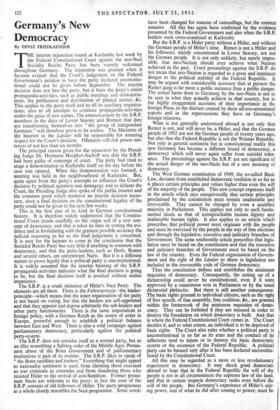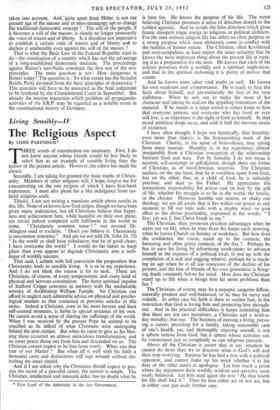Germany's New Democracy
By ERNSTFRIEDLAENDER
THE interim injunction issued at Karlsruhe last week by the Federal Constitutional Court against the neo-Nazi Socialist Reichs Party has been warmly welcomed throughout Germany. The injunction was granted when it became evident that the Court's judgement on the Federal Government's petition to have the party declared unconstitu- tional could not be given before September. The interim decision does not ban the party, but it bans the party's entire propaganda-activities, such as public meetings and demonstra- tions, •the publication and distribution of printed matter, &c. This applies to the party itself and to all its auxiliary organisa- tions; also to all attempts to continue propaganda-activities under the guise of new names. The announcement by the S.R.P. members in the diets of Lower Saxony and Bremen that they are transforming themselves into " the group of independent Germans " will therefore prove to be useless. The Ministers of the Interior in the Lander will be responsible for ensuring respect for the Court's decision. Offenders will risk prison sen- tences of not less than six months.
. The principal reason given for the injunction by the Presid- ing Judge Dr. Hermann Hoepker-Aschoff was that the S.R.P. had been guilty of contempt of court. The party had tried to stage a demonstration in Karlsruhe itself on the day before the case was opened. When this demonstration was banned, a meeting was held in the neighbourhood of Karlsruhe. But, quite apart from the party's attempts to influence the Court's decision by political agitation and demagogy and to defame the Court, the Presiding Judge also spoke of the public interest and the common good which rendered an interim decision neces- sary, since a final decision on the constitutional legality of the party could not be given in the next few weeks. This is the first case of its kind in German constitutional history. It is therefore widely understood that the Constitu- tional Court treads carefully on the virgin soil of a new con- cept of democracy, and that it takes its time in sorting the evi- dence and in formulating with the greatest possible accuracy the judicial reasoning as far as the final `judgement is concerned. It is easy for the layman to come to the conclusion that the Socialist Reichs Party has very little if anything in common with democracy, and that the party-leaders, such as Dorls, Remer and several others, are unrepentant Nazis. But it is a different matter to prove legally that, a political part)) is unconstitutional. It is widely assumed that the interim banning of the S.R.P. propaganda-activities indicates what the final decision is going to be, but the final decision itself is awaited without undue impatience. The S.R.P. is a crude imitation of Hitler's Nazi Party. The elements are all there. There is the Fahrerprinzip—the leader- principle—which means that the inner organisation of the party Is not based on voting, but that the leaders are self-appointed and that they appoint and depose arbitrarily the sub-leaders and other party functionaries. There is the same imperialism in foreign policy, with a German Reich as the centre of order in Europe, powerful enough to establish a political balance between East and West. There is also a wild campaign against parliamentary democracy, particularly against the political party-system. The S.R.P. does not consider itself as a normal party, but as an elite resembling a fighting order of the Middle Ages. Perma- nent abuse of the Bonn Government and of parliamentary institutions is part of its routine. The S.R.P. likes to speak of " the Bonn satellites .and traitors." Everything that might appeal to nationalist sentiment is used, from claiming those executed as war criminals as comrades and from slandering those who resisted Hitler to the revival of anti-Semitism. Former promi- nent Nazis are welcome in the party; in fact the core of the S.R.P. consists of old followers of Hitler. The party-programme as a whole closely resembles the Nazi, programme. Some words have been changed for reasons of camouflage, but the essence remains. All -this has again been confirmed by the evidence presented by the Federal Government and also when the S.R.P. leaders were cross-examined at Karlsruhe.
But the S.R.P. is .a Hitler party without a Hitler, and without the German people of Hitler's time. Remer is not a Hitler and his followers, mainly concentrated in Lower Saxony, are not the German people. It is not only unlikely, but nearly impos- sible, that neo-Nazism should ever achieve what Nazism achieved in the pasts Court proceedings against the S.R.P. do not mean that neo-Nazism is regarded as a great and imminent danger to the political stability of the Federal Republic. It may be argued with considerable accuracy that at present the Remer gang is far more a public nuisance than a public danger. The actual harm done to Germany by the neo-Nazis is not to be seen in what they actually achieve in that' country, but in the highly exaggerated accounts of their importance in the foreign Press, in the distrust created by these all-too-sensational reports and in the repercussions they have on Germany's foreign relations.
What is not generally understood abroad is not only that Remer is not, and will never be, a Hitler, and that the German people of 1952 are not the German people of twenty years ago, but also that the Federal Republic is not the Weimar Republic. Not only in general sentiment but in constitutional reality this new Germany has become a different brand of democracy, a democracy which will never again suffer from suicidal toler- ance. The proceedings against the S.R.P. are not significant of the actual danger of the neo-Nazis but of a new meaning of democracy.
The West German constitution of 1949, the so-called Basic Law, deviates from established-democratic tradition in so far as it places certain principles and values higher than even the will of the majority of the people. This new concept expresses itself in the article which says unequivocally that certain principles proclaimed by the constitution must remain unalterable and irrevocable. They cannot be changed by even a qualified majority in Parliament. This applies not only to such funda- mental ideals as that of unimpeachable human dignity and inalienable human rights. It also applies to an article which prescribes that political power must originate with the people and must be exercised by the people in the way of free elections and through the legislative, executive and judiciary branches of Government. The same unalterable article_ prescribes that legis- lation must be based on the constitution and that the executive and judiciary branches of Government must be based on the law of the country. Even the Federal organisation of Govern- ment and the right of the Lander to share in legislation are included in the irrevocable code of German democracy.
Thus the constitution defines and establishes the minimum requisites of democracy. Consequently, the setting up of a dictatorship could ',never be constitutional, even if it were approved by a unanimous vote in Parliament or by the usual dictatorial plebiscite. But there is still another consequence. The basic rights granted to individual citizens, such as the right of free speech, of free assembly, free coalition, &c., are granted within the framework of the minimum requisites of demo- cracy. They can be forfeited if they are misused in order to destroy the foundation on which democracy is built. And that is where the Federal Constitutional Court comes in. The Court decides if, and to what extent, an individual is to be deprived of basic rights. The Court also rules whether a political party is unconstitutional in so far as its aims and the conduct of its adherents tend to injure or to destroy the basic democratic system or the existence of the Federal Republic. A political party can be banned only after it has been declared unconstitu- tional by the Constitutional Court. All this may be regarded as a more or less revolutionary experiment in democracy. It may shock good democrats abroad to hear that in the Federal Republic the will of the people is not in all circumstances the supreme law of the land, and that in certain respects democracy ranks even before the will of the people. But Germany's experience of Hitler's seiz- ing power, and of what he did after coming to power, must be taken into account. And; quite apart from Hitler, is not our present age of the masses and of mass-demagogy apt to change the traditional democratic concept ? The will of the people, if it becomes a will of the masses, is clearly no longer necessarily the voice of reason and of liberty. Is it therefore not imperative to establish a certain code of reason and of liberty and to declare it unalterable even against the will of the masses ?
That is what the Basic Law of the Federal Republic tried to do—the constitution of a country which has not the advantage of a long-established democratic tradition. The proceedings against Remer's neo-Nazis. constitute the first test of the new principles. The main question is not : How dangerous is Remer today? The question is : To what extent has the Socialist Reichs Party deviated from the basic principles of democracy ? This question will have to be answered in the final judgement to be rendered by the Constitutional Court in September. But already the interim injunction which prohibits all propaganda- activities of the S.R.P. may be regarded as a notable event in the constitutional history of Getmany.



































 Previous page
Previous page